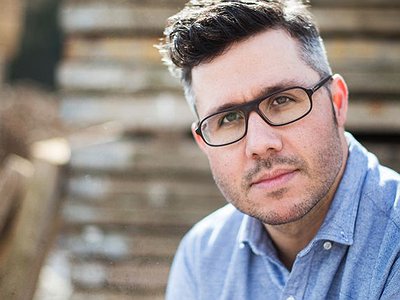The effect of a piece doesn't merely depend on the performance of the musicians, but also on the place it is performed at. How do you see the relationship between location and sound? In how far do you feel the current system of concert halls is still the right one for your music – or for contemporary music in general?
These are exciting times when it comes to the question of exactly where music is to be performed – anything goes, basically. I just watched a great clip on the web of John Adam’s Harmionielehre in a London car park for example! Piano Interrupted played in the amazing Radialsystem in December – an old water factory converted into a beautiful performance space.
That said, the concert hall system seems to me to be equally important, despite the various on-going battles between commentators about audience age, stuffiness and etiquette etc, this is still one of the best ways to experience a certain type of music where acoustics really matter- something orchestral, something challenging, or thoughtful or simply quiet for example.
The role of the composer has always been subject to change. What's your view on the (e.g. political/social/creative) tasks of composers today and how do you try to meet these goals in your work?
A generation ago most composers would have been affected or at least influenced by prevailing political ideologies- all those amazing Russian composers trying to keep their integrity under Stalin or the challenge of composing in the Third Reich for example. For an Englishman born in 1975, I do inevitably feel removed from this type of seismic political influence.
I once wrote music for a Greek cigarette advertising campaign. That is about as socio-political as my career has got so far. I certainly didn’t want to encourage the Greek nation to smoke but the practical concerns of earning a living outweighed this.
How, do you feel, could contemporary compositions reach the attention of a wider audience?
In our digital age, one of the best methods has to be film, TV and other media like computer games. It relies on those people commissioning the music, being brave of course, but it is possible to offer extremely contemporary sounds to the listening world through this medium without scaring people away! People then investigate these exciting soundtracks they have heard, because it is so easy to find out who the composer is through the power of the Internet. I am certain most people have come to my music through something visual for example. Indeed with sites like YouTube, it’s probably fair to say that contemporary compositions and composers are getting more exposure than ever before.
Music-sharing sites and -blogs as well as a flood of releases in general are presenting both listeners and artists with challenging questions. What's your view on the value of music today? In what way does the abundance of music change our perception of it?
I read a recent article where Thom Yorke now laments giving away Radiohead’s In Rainbows. He felt it basically hastened the ever-decreasing value of music. Maybe he’s taking a little too much responsibility on his shoulders but we are certainly in a confusing time.
The mass market has splintered, and we are seeing lots of strong niches springing up, with small dynamic record labels championing their particular flavour of music. I think discerning listeners are looking round for a ‘home’ for their eclectic tastes. In the indie-classical (neo-, post-, not sure what the latest vogue saying is) niche for example, a label like Erased Tapes has done a great job of creating an almost ‘family’ feeling both for its artists and as importantly, for its listenership.
There is certainly an impossible amount of music to wade through nowadays, and I think taste makers, such as respected blogs for example, have a vital role to play. Overall and perhaps overly optimistically, I do believe that somehow, allowing for the inevitable necessary slice of luck, the cream does still rise to the top, and really good music will find a way for itself to be heard.
Composers have traditionally found it hard to secure a living with their art. What are the financial realities you're living with and in which way, do you feel, could they be improved?
I was lucky enough to fall into writing music for advertising right at the beginning of my career. ‘Syncs’ have become an important revenue stream for all artists now, as it pays reasonably well in comparison to other parts of the music industry. Now, like most freelance musicians, I am trying to steer a delicate balance between picking projects that feed the mouth and projects that feed the soul. If your career is going in the right direction, occasionally you get projects that do both!
Usually, it is considered that it is the job of the composer to win over an audience. But listening is also an active, rather than just a passive process. How do you see the role of the listener in the musical communication process?
Yes, I think it is reasonable to expect the music to try to win over its listener. Equally as an artist, you hope that the listener is coming with an open mind.
Please recommend two artists to our readers which you feel deserve their attention.
I have just started a relationship with the record label Denovali, who have brought a whole host of artists to my attention. I very much enjoyed Poppy Ackroyd’s debut record, Escapement.
And I’m going to go for the inspirational Fred Hersch, who is of course the absolute godfather to pretty much all the top American jazz pianists on the scene at the moment.



